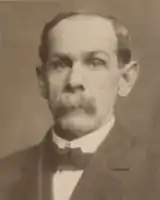Arthur C. Harman | |
|---|---|
 | |
| Member of the Virginia Senate from the 38th district | |
| In office January 13, 1904 – January 12, 1916 | |
| Preceded by | D. Gardiner Tyler |
| Succeeded by | Louis O. Wendenburg |
| Member of the Virginia House of Delegates from Richmond City | |
| In office December 4, 1901 – January 12, 1904 | |
| Preceded by | John E. Epps |
| Succeeded by | Edwin P. Cox |
| Personal details | |
| Born | Arthur C. Harman March 6, 1854 Staunton, Virginia, U.S. |
| Died | June 15, 1927 (aged 73) Richmond, Virginia, U.S. |
| Political party | Democratic |
| Spouse | Rachel Primrose Cochran |
| Alma mater | Virginia Military Institute |
Arthur C. Harman (March 6, 1854 – June 15, 1927) was an American businessman and Democratic politician who served in both houses of the Virginia General Assembly, representing the state capital of Richmond.
Early and family life
Born in Staunton, Virginia to then-Commonwealth's attorney (prosecutor) William Henry Harman and his wife, the former Margaret Susan Garber. His family had a tradition of military service, from his great-great grandfathers John Cunningham and George Moffett during the American Revolutionary War. His father served in the Virginia militia and U.S. Army during the Mexican-American War. During the American Civil War his father became an officer in the Virginia militia and Confederate States Army, helped to seize the Harpers Ferry arsenal and later died at the Battle of Waynesboro. Three uncles also served as Confederate officers, two under CSA General Stonewall Jackson; his uncle CSA Lt. L.T. Harman died of typhoid fever in the conflict. His other uncles became prominent in rebuilding Virginia's railroads. Harman would graduate from the Virginia Military Institute in 1874.
In 1891, Harman married Rachel Primrose Cochran, also of Staunton, and they had a daughter, Margaret Harman Moore (1894-1919)[1]
Career
The Harmans made Richmond their home, where A.C. Harman had a career in real estate. He also become president of the board of directors of the Virginia Penitentiary.[2]
Following adoption of the Virginia Constitution of 1901 by the General Assembly without a referendum, Harman ran as a Democrat (and member of the Martin organization, later the Byrd Organization) to represent the City of Richmond in the Virginia House of Delegates. He won one of five seats allocated to the city, as one of three new delegates, veterans Elben C. Folkes and S.L. Kelley winning re-election.[3][4] In 1903, voters elected Harman and George Wayne Anderson as the City of Richmond's two part-time representatives in the Virginia Senate (and five different men to represent them in the House of Delegates). Elben C. Folkes would replace Anderson as the other Richmond state senator in 1908, then James E. Cannon replaced Folkes in 1914[5] By 1922, senators elected their former fellow Harman to be their sergeant at arms.
Death and legacy
Arthur C. Harman died on June 15, 1927, survived for almost two years by his widow. Both are buried at Hollywood Cemetery.[6]
References
- ↑ findagrave no. 29033129
- ↑ Register of Former Cadets, centennial edition, (Lexington: Virginia Military Institute 1939)
- ↑ Cynthia Miller Leonard, The Virginia General Assembly 1619-1978 (Richmond: Virginia State Library 1978) p.578
- ↑ Swem, Earl G. (1918). Register of the General Assembly of Virginia, 1776–1918. Richmond: Virginia State Library. Retrieved September 27, 2016.
- ↑ Leonard pp. 584, 589, 594, 603, 607
- ↑ "Arthur C Harman (1854-1927) - Find a Grave". Find a Grave.
External links
- Arthur C. Harman at The Virginia Elections and State Elected Officials Database Project, 1776-2007